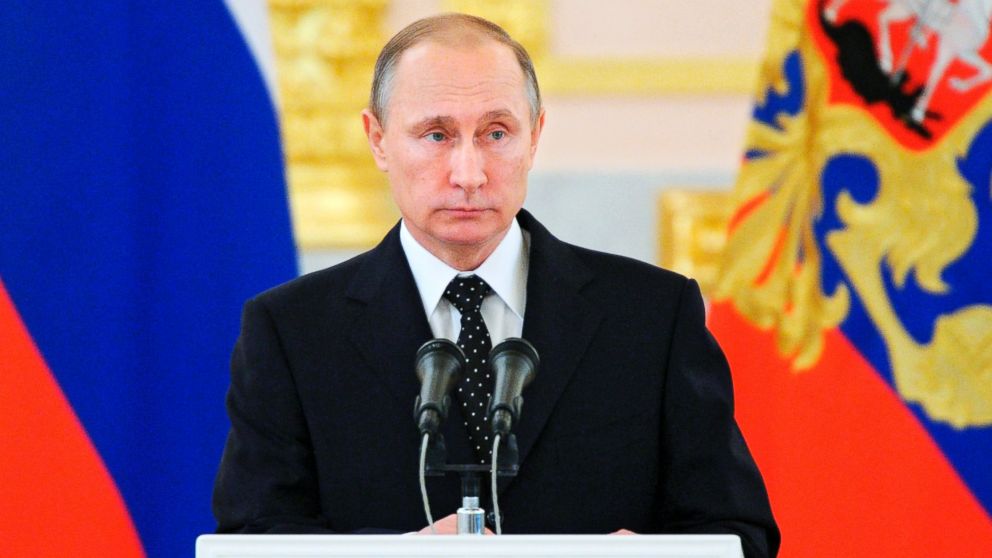Russia Threatens Economic Sanctions Against Turkey
It could cost both countries hundreds of millions of dollars.

MOSCOW — -- Russia is threatening retaliatory sanctions that could cost both it and Turkey hundreds of millions -- if not billions -- of dollars in trade and joint projects.
On Thursday, Russia announced it would be imposing economic “response measures” against Turkey. Prime minister Dmitry Medvedev said his government was developing sanctions that would hit Turkish interests across Russia’s economy, which could include a trade embargo, limiting investments, shutting down tourism and transportation links, as well as suspending major joint construction projects.
The government has given itself two days to finalize the measures but it left an ax hanging over Turkish involvement in swathes of the Russian economy.
Turkey is one of Russia’s biggest trade partners, with trade worth $44 billion dollars last year and Russian exports there worth $15 billion. It’s also a major Russian tourist destination, with 4 million Russians visiting a-year. Turkish goods account for around 15 percent of Russia’s vegetable imports, worth roughly $1 billion, and Turkish companies hold a major share of the construction market here.
All of these sectors are now under threat. Russian government agencies have lined up to declare that the sanctions may apply to their sector. Russia’s tourism agency said it would halt sales of trips to Turkey and transport officials warned Russian ports and airport could close to Turkish vessels. Crimea’s regional government announced it was freezing Turkish projects worth $500 million. Officials, ranging from Russia’s migration service to the agricultural ministry, have denounced what they called Turkish “treachery”.
“In the property sector, especially in the commercial sector, there are quite a lot of Turkish companies working and we don’t exclude that part of them will go from some major projects in the country. Our trust in them as partners is undermined,” Mikhail Myen, head of Russia’s Construction Ministry, told the business paper, RBK.
Vladimir Putin lamented that Turkey had “thoughtlessly” destroyed what he called the “unprecedented” good relations with Russia and demanded that Turkey apologize for downing the jet on the Syria border. Turkey has refused to apologized and insisted the Russian Su-24 bomber had violated its airspace, a claim Russia disputes.
Putin laid into the Turkish government again on Thursday night, calling president Tayyip Erdogan’s suggestion that Turkey had been unsure the plane was Russian “nonsense” and lashing out at the United States as well, saying Russia had informed American officials where the jet would be but they had done nothing to prevent the shooting down.
It was unclear yet how tough Russia sanctions will be in their final form. Sergei Aleksashenko, an economist with the Brookings Institute, said he believed the Kremlin was looking for “something loud and visible”.
On Friday, a partial embargo already seemed to be in place, as Russia’s consumer watchdogs imposed heightened border checks on Turkish goods, particularly fruits and vegetables that account for a third of Turkish imports. Local media reported Turkish goods-trucks backed up at the border, while Interfax reported the southern port of Novorossiisk-- through which 50 percent of Turkish vegetable imports come-- had ceased to take Turkish ships.
But while the sanctions would hurt Turkey, they are also likely to blow-back on the Russian economy. Turkey is the largest market for many Russian companies; the value of Russia’s exports there is five times that of Turkey’s to Russia. With Russia’s economy already battered by low oil prices and European sanctions over the Ukraine crisis, shutting out another major trading partner risked further braking its slow recovery.
The moves also threaten two flagship projects. The planned Akkuyu nuclear plant, that Russia was to build in Turkey, was now in doubt. Moscow has already invested $3 billion in the project, which was to be worth $22 billion. Likewise, the “Turkish Stream” gas pipeline that was to be a crucial alternative route for Russian gas to Europe may also now be pulled, Russian officials said.
Russia’s minister for Economic Development, Aleksei Ulyukaev, said both projects-- like all major joint ventures with Turkey-- were now under review.
Some analysts doubted whether Russia will really follow through on the worst of its threats. Christopher Shiells, an emerging markets analyst at Informa Global Markets, said he felt the gas pipeline was too big a deal to stop.
“With Putin it’s all about image,” Shiells said. “Once things blow over, I think you see some of these projects coming back online.”



